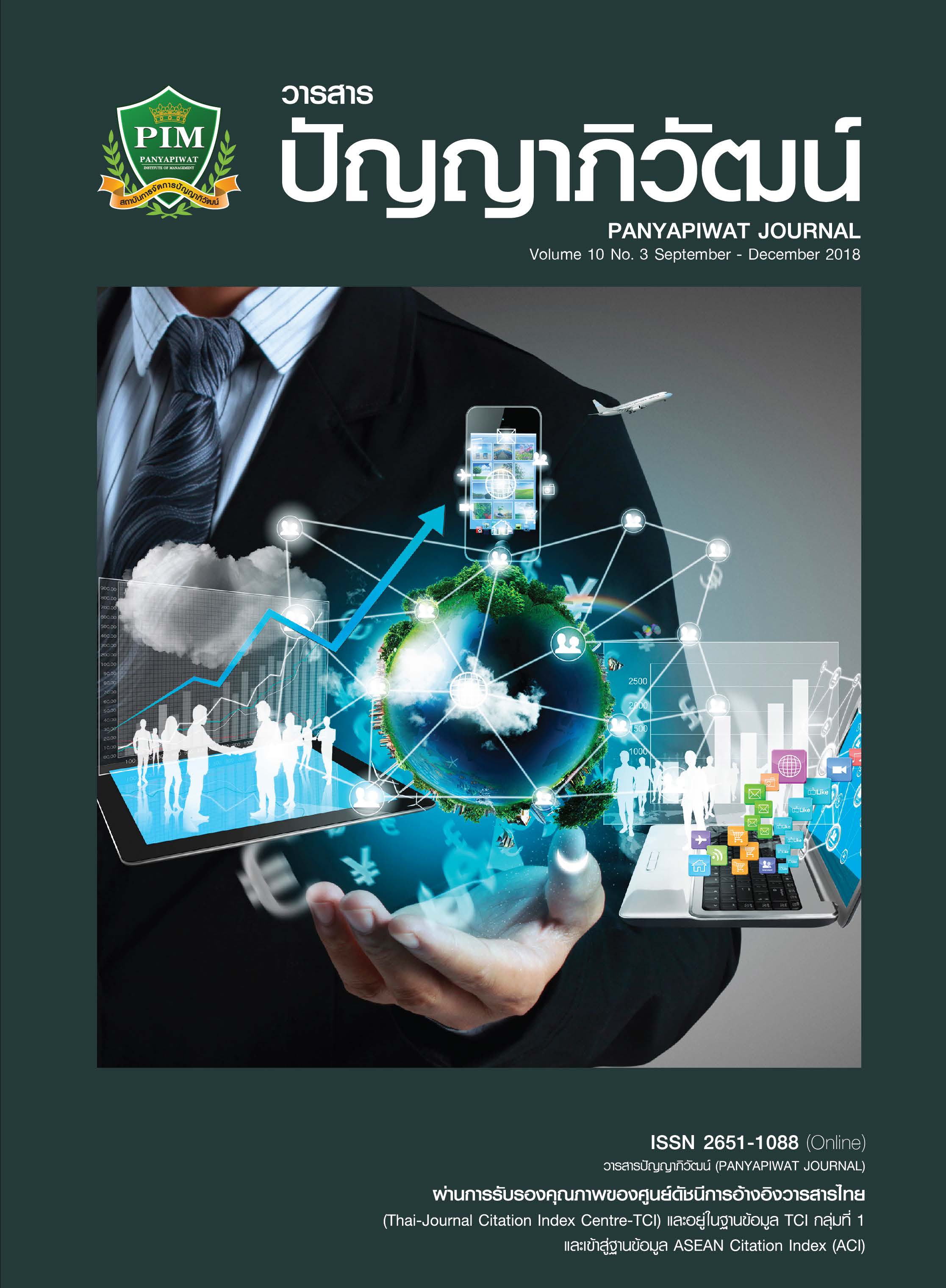การพัฒนาหลักสูตรฝึกอบรมที่มีผลต่อประสิทธิภาพของพนักงานปฏิบัติการระดับ 4 กลุ่มวิชาชีพหลัก กลุ่มวิชาชีพสนับสนุนในการขับเคลื่อนองค์การรัฐวิสาหกิจแห่งหนึ่งสู่การเป็นองค์การสมรรถนะสูง (HPO)
Main Article Content
บทคัดย่อ
การศึกษานี้มีวัตถุประสงค์ 1) เพื่อพัฒนาหลักสูตรการฝึกอบรมพนักงานปฏิบัติการระดับ 4 กลุ่มวิชาชีพหลัก กลุ่มวิชาชีพสนับสนุนในการขับเคลื่อนองค์การสู่การเป็นองค์การสมรรถนะสูง (HPO) 2) เพื่อประเมินประสิทธิผลหลักสูตรการฝึกอบรมเพื่อพัฒนาพนักงานปฏิบัติการระดับ 4 กลุ่มวิชาชีพหลัก กลุ่มวิชาชีพสนับสนุน และ 3) เพื่อประเมินประสิทธิภาพของพนักงานปฏิบัติการระดับ 4 กลุ่มวิชาชีพหลัก กลุ่มวิชาชีพสนับสนุนที่เข้าอบรมในหลักสูตร จำนวน 152 คน โดยหลักสูตรฝึกอบรมได้ผ่านการประเมินจากผู้เชี่ยวชาญและผู้บริหาร และจัดฝึกอบรมแก่พนักงานทั้งหมด 10 หลักสูตร โดยแบ่งเป็น 2 กลุ่ม กลุ่มละ 76 คน ดำเนินการจัดอบรมกลุ่มละ 10 วัน จัดขึ้นระหว่างวันที่ 13 มีนาคม ถึง 9 พฤษภาคม 2561 ซึ่งเครื่องมือที่ใช้ในการวิจัยนี้ประกอบด้วยแบบทดสอบ Pre Test–Post Test แบบประเมินการมีส่วนร่วมระหว่างการอบรม แบบทดสอบ One page Application (อนุทิน) แบบฝึกหัดการถอดบทเรียนจากการศึกษาดูงาน แบบทดสอบการสอบประมวลผล และแบบสอบถามแบบมีโครงสร้าง ได้แก่ แบบวัดความพึงพอใจของผู้เข้าอบรม และแบบประเมินประสิทธิภาพของผู้เข้าอบรม ผลการวิจัยพบว่า กระบวนการพัฒนาหลักสูตรอบรมประกอบด้วย 4 ขั้นตอน คือ 1. การวิเคราะห์งาน 2. การออกแบบและพัฒนาหลักสูตรฝึกอบรม 3. การทดลองใช้หลักสูตรฝึกอบรม และ 4. การประเมินผลและปรับปรุงหลักสูตรฝึกอบรม สำหรับหลักสูตรการฝึกอบรมเพื่อพัฒนาพนักงานปฏิบัติการระดับ 4 กลุ่มวิชาชีพสนับสนุนผู้เข้าอบรมทั้ง 2 กลุ่มได้เข้าอบรมเกินร้อยละ 70 ของระยะเวลาการอบรมทั้งหมดและด้านผลสัมฤทธิ์มีคะแนนเฉลี่ยเท่ากับ 76.22 คะแนน ส่วนผลความพึงพอใจต่อการดำเนินการหลักสูตรฯ จำนวน 8 หัวข้อในระดับดีมาก และทัศนคติในการฝึกอบรมและประสิทธิภาพในการปฏิบัติงานภาพรวมอยู่ในระดับดีมาก โดยเฉพาะด้านคุณภาพของงาน
Article Details
“ข้าพเจ้าและผู้เขียนร่วม (ถ้ามี) ขอรับรองว่า บทความที่เสนอมานี้ยังไม่เคยได้รับการตีพิมพ์และไม่ได้อยู่ระหว่างกระบวนการพิจารณาลงตีพิมพ์ในวารสารหรือแหล่งเผยแพร่อื่นใด ข้าพเจ้าและผู้เขียนร่วมยอมรับหลักเกณฑ์การพิจารณาต้นฉบับ ทั้งยินยอมให้กองบรรณาธิการมีสิทธิ์พิจารณาและตรวจแก้ต้นฉบับได้ตามที่เห็นสมควร พร้อมนี้ขอมอบลิขสิทธิ์บทความที่ได้รับการตีพิมพ์ให้แก่สถาบันการจัดการปัญญาภิวัฒน์หากมีการฟ้องร้องเรื่องการละเมิดลิขสิทธิ์เกี่ยวกับภาพ กราฟ ข้อความส่วนใดส่วนหนึ่งและ/หรือข้อคิดเห็นที่ปรากฏในบทความข้าพเจ้าและผู้เขียนร่วมยินยอมรับผิดชอบแต่เพียงฝ่ายเดียว”
เอกสารอ้างอิง
Awakul, V. (2007). Training. Bangkok: Chulalongkorn University Book center. [in Thai]
Boonritmontri, P. (2007). Training to enhance the on the job training for supervisors in the electronics industry: case study of Cal-Comp Electronics manufacturing Pub. Co., Ltd. (Thailand). Doctor of Philosophy Program in Adult Education Graduate, Srinakharinwirot University. [in Thai]
Boonterm, T. (2013). Higher Education Development: Case study of Khon Kaen University. Research Report, Khon Kaen University. [in Thai]
Decharin, P. (2011). Strategic planning. Bangkok: Offce of the Public Sector Development Commission Handouts PMQA. [in Thai]
Divya, K. & Gomathi, S. (2015). Effective Work Place Training: A Jump Starter to Organizational Competitive Advantage through Employee Development. Mediterranean Journal of Social Sciences, 6(3), 49-53.
Gil, A. J., Garcia-Alcaraz, J. L. & Mataveli, M. (2015). The training demand in organizational changes processes in the Spanish wine sector. European Journal of Training and Development, 39(4), 315-331.
Hirunkiti, P. (2009). Marketing research. Bangkok: Thammasarn [in Thai]
Kesornpikul, C. (2012). The Development of Training Curriculum for Thai Language Teachers in Analytical
Thinking Competencies. Doctor of Education Program, Educational Administration, Sripatum University. [in Thai]
Klayluck, P., Chanbanchong, C., Pakdeewong, P. & Konpong, A. (2013). A Model of Teamwork Competency Development for Education Personnel Work in the Offce of Primary Education Service Areas. Journal of Education Naresuan University, 15(5), 136-145. [in Thai]
Kongterm, S. (2013). The Study of Readiness to Asean Community of Students Phetchabun Rajabhat University. Faculty of Education, Phetchabun Rajabhat University. [in Thai]
Kongyeun, K. (2009). The training curriculum development for competency encouragement of the heads of vocational education incubation center in the college under the offce of vocational education commission. The Doctor of Philosophy Degree in Educational Administration, Vongchavalitkukul University. [in Thai]
Kulkarni, P. P. (2013). A Literature Review on Training & Development and Quality of Work Life. Journal of Arts, Science & Commerce, 4(2), 136-143.
Lawler III, E. E. (2005). Creating High Performance Organization. Asia Pacifc Journal of Human Resources, 43,10-17
McClaran, S. R. (2003). The effectiveness of personal tranning on changing attitude towards physical activity.
J Sports Sci Med, 2(1), 10-14.
McGhee, W. & Thayer, P. W. (1961). Training in Business and Industry. New York: Wiley.
Niazi, A. S. (2011). Training and Development Strategy and Its Role in Organizational Performance. Journal of Public Administration and Governance, 1(2), 42-57.
Pallavi, P. K. (2013). A literature review on training & development and quality of work life. Journal of Arts, Science & Commerce, 4(2), 136-143.
Phannuek, A. (2011). Research and Development of Program for developing the basic school administrators Competency. Doctor of Philosophy Thesis in Educational Administration, Graduate School, Khon Kaen University. [in Thai]
Poolkrajang, A. (2007). A training program development for supervisors to develop a job instruction course in establishments. Doctor of Philosophy in Industrial Education Curriculum Research and Development, King Mongkut’s University of Technology North Bangkok. [in Thai]
Sanchez, R. (2001). Knowledge Management and Organizational Competence. New York: Oxford University Press.
Sri, D. K. & Gomathi, S. (2015). Effective Work Place Training: A Jump Starter to Organizational Competitive Advantage through Employee Development. Mediterranean Journal of Social Sciences, 6(3), 49-53.
Sumonsart, T., Tangsomchai, C. & Santidhirakul, O. (2018). Habit level of employees at electricity generating authority of Thailand Mae Moh mine by applying the seven habits of highly effective people principle. Panyapiwat Journal, 10(Special), 164-179. [in Thai]
Thitikunrat, K. (2013). The staff performance effciency of employees in Sunshine International Company Limited. Independent Study. M.B.A. (Business Administration), Rambhaibarnirajabhat University. [in Thai]
Waal, A. A. (2007). The characteristics of a high performance organization. Business Strategy Series, 8(3), 179-185.
Wachayanonth, N. (2008). New Dimension in Human Capital Management. Bangkok: Grafco Systems. [in Thai]
Wanpiroon, P. (2011). The Development of Blended Learning Model by Using Cognitive Tools to Develop Critical Thinking Skills. Bangkok: King Mongkut’s University of Technology North Bangkok. [in Thai]
Wexley, K. N. & Latham, G. P. (1991). Developing and training human resources in organization (2nd ed.). New York: Harper Collins.
Winfred, A. Jr., Winston, B. Jr., Edens, P. S. & Bell, S. T. (2003). Effectiveness of Training in Organizations: A Meta-Analysis of Design and Evaluation Features. Journal of Applied Psychology, 88(2), 234-245.
Wongprasert, C. (2005). Knowledge management for business frms. Bangkok: Expernet. [in Thai]


